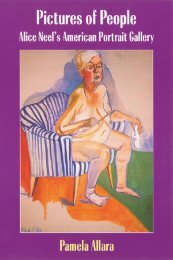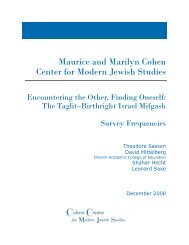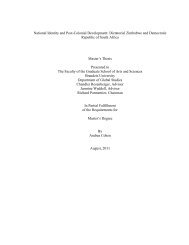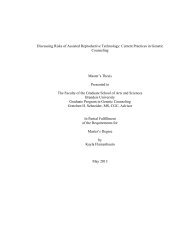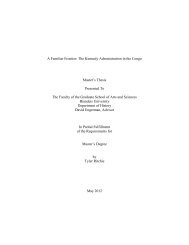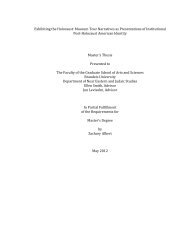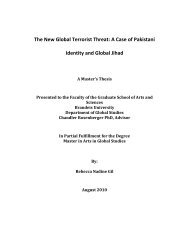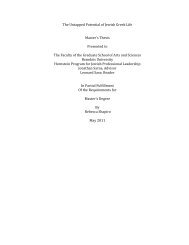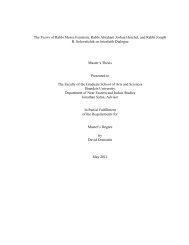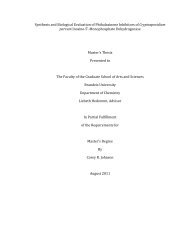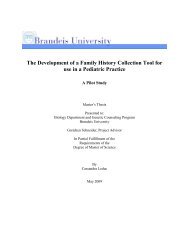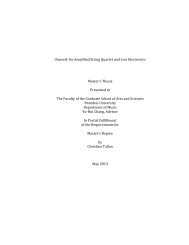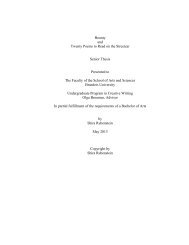Yet Ben Gurion's next letter, dated January 8, 1965, is much more personal. Hehas apparently read <strong>Benson</strong>'s book Crossfire – The Eight Years with Eisenhower, <strong>and</strong>mentions that <strong>the</strong> history <strong>of</strong> <strong>the</strong> Church that <strong>Benson</strong> sent him “is highly instructive.” He<strong>the</strong>n expresses, for <strong>the</strong> first time in any <strong>of</strong> <strong>the</strong> letters, a commonality in belief with<strong>Benson</strong> “that 'we are spiritual children <strong>of</strong> our Heavenly Fa<strong>the</strong>r' <strong>and</strong> that 'we will bejudged by our faith <strong>and</strong> good works.'” Whe<strong>the</strong>r he is quoting <strong>Benson</strong> or one <strong>of</strong> <strong>the</strong>sources <strong>of</strong> literature that <strong>Benson</strong> sent him, is unclear, but his change <strong>of</strong> tone to one morepersonal <strong>and</strong> sympa<strong>the</strong>tic is most interesting. It reveals, perhaps, a slight shift in attitude.Up to this point, <strong>the</strong> relationship appears a bit more engaging on <strong>the</strong> side <strong>of</strong> <strong>Benson</strong>, whoconsistently shares his beliefs <strong>and</strong> “sincere friendship” with Ben Gurion <strong>and</strong> <strong>the</strong> Jewishpeople. Yet here, Ben Gurion expresses his own sense <strong>of</strong> unity with <strong>Benson</strong>'s beliefs,while positing no contradiction as in previous discussions.The next letter simply refers to <strong>the</strong> current political climate in <strong>the</strong> United <strong>State</strong>s,<strong>and</strong> a hope that <strong>Benson</strong> will “like <strong>the</strong> elected President,” despite his failed support <strong>of</strong>Goldwater. The final letter between <strong>the</strong> two (although, as noted, more correspondencelikely exists) is one <strong>of</strong> sympathy <strong>and</strong> condolences to Ben Gurion at <strong>the</strong> passing <strong>of</strong> hiswife in 1968. <strong>Benson</strong> claims that she is someone he considers “a true friend,” <strong>and</strong> adds,“May I say. . . my bro<strong>the</strong>r, that I extend my love <strong>and</strong> sympathy <strong>and</strong> assure you, <strong>and</strong> I amsure you already realize, that life is eternal.” <strong>Benson</strong>'s use <strong>of</strong> <strong>the</strong> term “bro<strong>the</strong>r” isstriking <strong>and</strong> revealing <strong>of</strong> both his sentiments discussed earlier, <strong>the</strong> familial bond betweenMormons <strong>and</strong> Jews, <strong>and</strong>, even more importantly, his deep <strong>and</strong> abiding affection for <strong>the</strong><strong>Israel</strong>i leader. He reiterates that bond in <strong>the</strong> closing <strong>of</strong> <strong>the</strong> letter: “faithfully your friend62
<strong>and</strong> bro<strong>the</strong>r, <strong>Ezra</strong> <strong>Taft</strong> <strong>Benson</strong>.” Again, with this letter <strong>of</strong> sympathy, he also apparentlysent some sort <strong>of</strong> literature, although <strong>the</strong> title is not mentioned.The final letter comes, as mentioned, not from <strong>Benson</strong> or Ben Gurion, but fromMichael Ravid, Consul General in Los Angeles, to Ben Gurion. Ravid apparently hadvisited Salt Lake City to discuss tourism to <strong>Israel</strong>. He mentions three distinct times that<strong>Benson</strong> spoke to him <strong>of</strong> his relationship with Ben Gurion, <strong>and</strong> asked to be remembered tohim, giving <strong>the</strong> impression that <strong>Benson</strong> took great care to press this point upon <strong>the</strong>Consul General during his visit.While none <strong>of</strong> <strong>the</strong> relationships with o<strong>the</strong>r <strong>Israel</strong>i leaders seem to evidence <strong>the</strong>same strength <strong>and</strong>, for <strong>Benson</strong>, at least, sense <strong>of</strong> satisfaction that <strong>the</strong> relationship withBen Gurion evoked, <strong>the</strong>y are still noteworthy as part <strong>of</strong> <strong>Benson</strong>'s relationship with <strong>the</strong>Jews <strong>and</strong> <strong>the</strong> Jewish <strong>State</strong>. <strong>Benson</strong> mentions in his “Message to Judah from Joseph” thatno visits in <strong>Israel</strong> had “been more impressive than <strong>the</strong> visits with David Ben Gurion, LeviEshkol, <strong>and</strong> Moshe Dayan.” 183 After his visit with President Ben-Zvi in 1960, <strong>Benson</strong>remarked, “It is my feeling that no people are thought <strong>of</strong> more highly in <strong>Israel</strong> than weare.” 184<strong>Benson</strong> also spoke warmly <strong>of</strong> his visits with Levi Eshkol <strong>and</strong> Moshe Dayan, <strong>and</strong>when in 1971 Dayan's wife visited Salt Lake City, Utah, she made a specific request tosee “Elder <strong>and</strong> Sister <strong>Benson</strong>, long-time acquaintances.” 185In 1979 <strong>Benson</strong> againtraveled in <strong>the</strong> Middle East as an Apostle. He had occasion to renew some <strong>of</strong> hisacquaintances, among <strong>the</strong>m Abba Eban, whom <strong>Benson</strong> had met years earlier inWashington while serving as Secretary <strong>of</strong> Agriculture. Eban is reported to have spoken183184185<strong>Benson</strong>, “Message to Judah,” 1.From a letter from <strong>Benson</strong> to President <strong>of</strong> <strong>the</strong> Church, Joseph Fielding Smith, August 14, 1960. Citedin Dew, Biography, 350.Dew, Biography, 419.63
- Page 2 and 3:
AcknowledgementsI am indebted to Pr
- Page 4 and 5:
Table of ContentsIntroduction - 1Ch
- Page 6 and 7:
elationship in any depth.In researc
- Page 8 and 9:
friendships with various Israeli le
- Page 10 and 11:
Joseph Smith taught that Latter-day
- Page 12 and 13:
Gentiles, and it will be again inha
- Page 14 and 15:
for their long suffering. Yet, he,
- Page 16 and 17: focus on both the fulfillment of pr
- Page 18 and 19: Smith and Brigham Young, as previou
- Page 20 and 21: Smith, the members of the group “
- Page 22 and 23: Jews.'” 46Benjamin further descri
- Page 24 and 25: Chapter 2: Benson's Religious Leade
- Page 26 and 27: audiences. The first, called, “Je
- Page 28 and 29: Benson's sense of kinship for the J
- Page 30 and 31: eturn of the Jews to the land of Pa
- Page 32 and 33: general mention of his efforts at s
- Page 34 and 35: Or perhaps it did not aid in his ap
- Page 36 and 37: about Jews and Israel, throughout t
- Page 38 and 39: and Peter Grose describe the frustr
- Page 40 and 41: Israel's victory in the Six Day War
- Page 42 and 43: the Messiah. Indeed, both Benson an
- Page 44 and 45: those visits, as opposed to those o
- Page 46 and 47: U.S. agricultural products on credi
- Page 48 and 49: The American public, though divided
- Page 50 and 51: States.” 133Indeed, a Gallup poll
- Page 52 and 53: with Britain and France, for their
- Page 54 and 55: many Americans that Israel was now,
- Page 56 and 57: those experiences to give validity
- Page 58 and 59: Benson, “I want you to pray to Go
- Page 60 and 61: gathering. Some of those themes inc
- Page 62 and 63: Ben Gurion and Levi Eshkol, both of
- Page 64 and 65: sending “two Mormon Books,” and
- Page 68 and 69: on this occasion with Shimon Peres
- Page 70 and 71: cultivate land for crops in the 194
- Page 72 and 73: attitude in the Synagogue Light art
- Page 74 and 75: United States, his views on Israel
- Page 76 and 77: eminded the host that he had not be
- Page 78 and 79: Thee, O Father, Lord of heaven and
- Page 80 and 81: "Though Thy servant is now far from
- Page 82 and 83: BibliographyAlteras, Isaac. Eisenho
- Page 84 and 85: Madsen, Truman G. “Mormon Attitud



